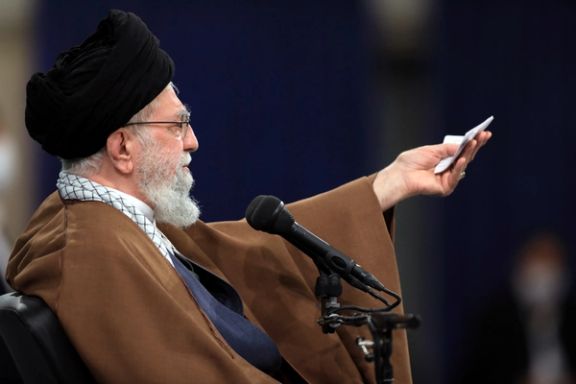Clerics Should Not Be On Government Payroll: Iran's Sunni Leader

Iran's top Sunni cleric Mowlavi Abdolhamid says clerics and religious seminaries must not be funded by the government to remain independent and critical.

Iran's top Sunni cleric Mowlavi Abdolhamid says clerics and religious seminaries must not be funded by the government to remain independent and critical.
“Clerics must be independent and have their own opinions to be able to speak the truth and call the government to enjoin what is good and forbid it from doing what is wrong,” Abdolhamid said in yet another fiery Friday sermon in the southeastern city of Zahedan.
Abdolhamid who has proven to be the unofficial voice of the country’s Sunni population told his congregation that he has on many occasions warned that seminary students and teachers must not receive salaries from the government and seminaries should not be funded by the government.
The Sunni cleric has somewhat become popular even among Shiites for standing up to the regime.
The outspoken cleric stressed that he believes people should be responsible for funding and managing religious institutions. “It’s a great mistake to allocate a budget to seminaries and religious scholars.”
Salaried religious scholars will be dependent on the government and “their mouths will be shut like they have adopted silence [about what the government is doing] now,” he said.
Iran's government annually allocates tens of millions of dollars to religious seminaries and other religious institutions that play the role of its propaganda arm.
In his sermon Abdolhamid also referred to the recent revelations of former director of the notorious Evin prison in Tehran, Hossein Mortazavi-Zanjani, who on April 29 had alleged that President Ebrahim Raisi, then the deputy prosecutor of Tehran, was directly involved in the killing of political prisoners in 1988.
Mortazavi-Zanjani had also said that virgin female prisoners were forcibly married to jailers and raped by them before being executed to stop them from being admitted to heaven on account of their virginity when they died.
“I was shocked by what I heard,” he said, adding that religious scholars (senior clergy) must not remain silent about this matter and the atrocities happening in Iranian prisons now.
The executions were carried out based on a fatwa by Iran's then supreme leader, Ruhollah Khomeini, against the MEK (The People's Mojahedin Organization of Iran) which carried out a wave of bombings in Iran and struck an alliance with Saddam Hussein during the 1980-88 war.
Most victims were linked to the MEK but there were also others with links to leftist and secular groups such as Fadaiyan Khalq Organization (FKO) and the Tudeh Party as well as some Kurdish groups such as Komala and the Kurdish Democratic Party of Iran.
In his sermon, Abdolhamid once again brought up the issue of a referendum to allow the people of Iran to express their views about clerical rule.
“It was our fault that they don’t want Islam and they should not be hit in the head to accept a certain thing now that they are dissatisfied [with the Islamic Republic],” he said, adding that everyone, whether religious or non-religious, should be allowed to live peacefully together and build the country’s future.
“The religious should be allowed to pray and those without religion should be able to do whatever they want. That’s why there should be referendum to find out what the absolute majority of people want and accept,” he said.
Abdolhamid was among the first regime critics who called for a constitutional referendum about 50 days into the wave of protests following the death in custody of 22-year-old Mahsa Amini in September.

Supreme Leader Ali Khamenei has flatly dismissed the possibility of a referendum and suggested that people lack the faculties required for making decisions about important matters.
After the prayers, Abdolhamid’s congregation took to the streets of Zahedan for the 35th consecutive week and chanted slogans against the regime. Residents have been protesting every Friday since September 30, when security forces opened fire on civilians, killing nearly 90 protesters. The incident has come to be known as the Bloody Friday of Zahedan.
Sunnis constitute at least 10% of Iran's 88 million population and Zahedan, where thousands attend Abdolhamid’s Friday prayers every week is one of the few Sunni-majority cities in predominantly Shiite Iran.